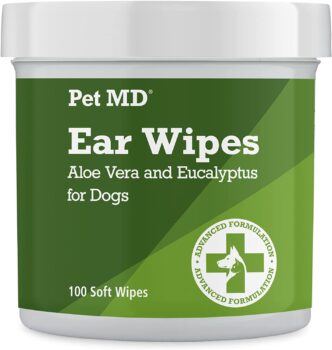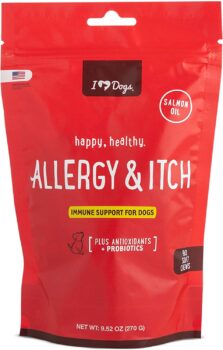Bull Terriers are a charismatic breed known for their spunky personality and distinctive “egg-shaped” head. However, these dogs are also susceptible to ear infections. This article covers 11 strategies to treat and prevent ear infections, with an emphasis on the benefits of Omega-3 in their diet.

iHeartDogs is reader supported. Some of the links below may be paid affiliate links, where we receive a small commission on a product at no additional cost to you.
1. Regular Ear Cleaning
Consistent ear cleaning can remove wax and debris, preventing bacterial growth that often leads to infections. Use a vet-approved solution, and never insert anything into the ear canal.
Our favorite ear cleaner is these PetMD brand ear wipes on Amazon.
2. Dry Ears After Wet Exposure
After your Bull Terrier has been swimming or bathed, ensure to thoroughly dry their ears to prevent a moist environment that could promote infections.
3. Regular Vet Check-ups
Regular vet visits can help identify signs of ear infections early. Your vet can also offer advice on proper ear care and maintenance.
4. Balanced Diet
A well-balanced diet supports a robust immune system. Omega-3 fatty acids can help to reduce inflammation and manage allergies, which may lower the risk of ear infections.
5. Omega-3 Supplementation
Omega-3 fatty acids, especially EPA and DHA found in fish oil, can be beneficial in reducing allergies and inflammation. Talk to your vet about suitable Omega-3 supplements for your Bull Terrier.
We’re fans of this Norwegian salmon oil on Amazon. It’s a bright orangish-pink color and has no fishy smell at all due to it’s ultra high purity.
6. Allergy Management
If your Bull Terrier has allergies, managing them effectively can help prevent ear infections. This could involve changes in diet, environmental modifications, or prescribed medications.
A few good supplements to help your dog’s allergies are apple cider vinegar, quercetin, and colostrum, all of which are found in many natural allergy supplements like this one.
7. Avoidance of Allergens
If specific allergens trigger your dog’s allergies, limiting their exposure to these allergens can help prevent allergic reactions and subsequent infections.
8. Regular Exercise
Regular exercise contributes to overall health and a robust immune system, helping to ward off infections.
9. Grooming
Regular grooming, including trimming the hair around the ears, can enhance ventilation and reduce the chance of ear infections.
10. Healthy Weight Maintenance
Overweight dogs are at an increased risk for various health issues, including ear infections. Regular exercise and a balanced diet can help maintain a healthy weight.
11. Use of Prescribed Medications
If your Bull Terrier is prone to ear infections, your vet may prescribe preventative medications. Follow their instructions meticulously.
FAQ
Q1: What are the signs of an ear infection in Bull Terriers? A: Common signs include frequent ear scratching, head shaking, redness, swelling, or discharge from the ear.
Q2: What causes ear infections in Bull Terriers? A: Many factors can lead to ear infections, including bacteria, yeast, ear mites, foreign bodies in the ear, or excessive moisture. Allergies can also contribute to ear infections.
Q3: Can ear infections in Bull Terriers become severe? A: Yes, if left untreated, ear infections can lead to chronic ear disease or hearing loss.
Q4: Can I use human ear infection treatments on my Bull Terrier? A: No. Always consult your vet before administering any treatments. Human medications may not be suitable for your dog and can potentially cause harm.
Q5: How do I apply ear drops to my Bull Terrier? A: Lift the ear flap, apply the drops as directed, then massage the base of the ear. Always follow your vet’s specific instructions.
Q6: Why does my Bull Terrier keep getting ear infections? A: Several factors could be causing recurrent ear infections, such as unmanaged allergies, frequent water exposure, or an underlying health condition. Your vet can help identify the cause.
Q7: How can diet impact ear infections in my Bull Terrier? A: A balanced diet helps to maintain a healthy immune system. Omega-3 fatty acids, in particular, can help manage inflammation and allergies, reducing the likelihood of ear infections.
Q8: Are there dog breeds more prone to ear infections than Bull Terriers? A: While all dogs can get ear infections, breeds with floppy ears are generally more prone. Regular vet check-ups and preventive care can help manage this risk.
Q9: How often should I clean my Bull Terrier’s ears? A: A weekly cleaning is typically recommended, but your vet might advise a different schedule based on your dog’s specific needs.
Q10: What should I do if I suspect an ear infection? A: Contact your vet immediately if you suspect an ear infection. Prompt treatment can prevent further complications and ensure your Bull Terrier’s comfort and wellbeing.
A mix of regular ear cleaning, a diet rich in Omega-3, and overall good health maintenance can go a long way in preventing ear infections in your Bull Terrier. Always consult with your vet for personalized advice tailored to your dog’s unique needs.



 Toledo, United States.
Toledo, United States.
